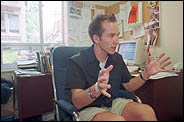kaleidoscope
Wojtek Baraniak: Politics and the paparazzi
 PHOTO: Owen Egan
PHOTO: Owen Egan |
|
If Wojtek Baraniak ever had any aspirations of becoming a politician, he doesn't have them now. This year's president of the Students' Society of McGill University finds the business of student politics a little "too hectic" and a little too invasive of his privacy for it to be a prolonged lifestyle.
He points to a photograph featured in last March's McGill Daily, of him and his girlfriend sunning themselves on a Cuban beach. This was the paper's idea of fun, but Baraniak found it invasive, especially of his girlfriend's privacy.
And, while he's happy to put in the 40 to 50 hours per week (for which he receives a stipend of $15,000) it takes to run the SSMU, once he's in the workforce, employed as the diplomat he aspires to be, he wants to have his own time.
"I'm a quiet person. I like my personal time. I want to have a family and I think politics could take away from that. [Former US secretary of state Henry] Kissinger once said that 'student politics makes me long for the simplicity of the Middle East,' and I know what he means. You can't do anything without offending someone on campus."
The legal battle with the McGill Daily, of course, is a case in point, and the paper and SSMU are still in court battling over the matter of how much space ought to be allocated to the Daily in the University Centre and how much rent, if any, the paper should pay.
But that high-profile battle hasn't been Baraniak's only headache during this busiest time of the year for the SSMU. Last week, the president and members of the SSMU found themselves ripping pages 73-78 out of the Student Handbook.
Why? Because of complaints made about the offensive way in which certain residences were described.
But the 23-year-old honours political science student (with "an expandable minor in economics") has no regrets about his decision to run again for public office. After serving as vice-president (community & government) last year, Baraniak felt that he had projects to finish. "I wasn't fulfilled last year and I knew I could do more. Twenty years from now I would have regrets if I didn't keep at this."
The key project Baraniak refers to is the completion of renovations to the basement and first floor of the University Centre. Having taken out a loan for $700,000, Baraniak hopes to see the work done by year's end. He also wants to see the planned daycare for students' kids on its feet.
Baraniak's job requires a nimble mind able to grasp the broad range of issues affecting his 16,000-member constituency. Recently, for instance, he helped the Ad Hoc Muslim Prayer Group find a new prayer space when they were about to lose their spot in the Birks Building.
"Here I was, this Roman Catholic, learning the five pillars of Islam in order to explain to the administration why we had to find a new prayer room. I like having to quickly learn and adapt," he says, adding that ultimately, the students were given another year in Birks.
The example of helping others Baraniak takes from his parents, Poles who immigrated in the '60s. Wojtek remembers the Ottawa home in which he grew up as a kind of "Pier 21 in Halifax [where newcomers used to land]; all the sponsored relatives passed through."
Helping people to help or defend themselves, however, requires that they be informed of the choices available. Baraniak wants his administration to be as accessible as possible and is working on finding ways to let people know where to find information on student issues.
"I can't accept that people don't know what's going on. The information is there."
He also expects good communication from the University. He's angry about the decision to tack on a $150 "info-technology" fee, starting this year. "Students at least deserve an explanation," he says, adding that the administration -- here and at other Quebec universities -- uses such fees as a means of circumventing the freeze on tuition.
As for his own method of decision making, Baraniak consults widely with his executive and with former presidents. "I have a lot of respect for the earlier presidents," he notes.
Guy Brisebois, the general manager of SSMU, has seen seven presidents come and go and this eighth one, he says, stands out for his skill in bringing the executive together and giving it a focus.
"He's very good at grouping the VPs together. This summer, they developed a mission statement for their year. Not many have done that in the past."
 |
||||
|
It'll be kind of nice to be selfish and go out whenever I want and come in whenever I want and not have to worry about watching my brother, unloading the dishwasher, stupid little things like that... |
||||
Shuttle bussing
 ILLUSTRATION: Tzigane
ILLUSTRATION: Tzigane |
|
There are plenty of folks on the downtown campus who know next to nothing about McGill's Macdonald Campus on the West Island. Given that it can take 95 minutes or so to get from one campus to the other by public transportation, it's not a trip to be embarked on lightly.
It's about to become much easier to move from one campus to the other. With prodding from Dean of Agricultural and Environmental Sciences Deborah Buszard, McGill has set up an inter-campus bus service that will get you from one campus to the other in about 35 minutes.
Buses leave from each campus to go to the other six times a day -- at 7:20 am, 8:40 am, 12:40 pm, 1:40 pm, 4:40 pm and 5:40 pm. From Mac, the buses leave from the parking lot behind the Centennial Centre, while the downtown buses leave from a point just west of the Roddick Gates.
Buszard says that with the two campuses working much more closely these days -- her faculty collaborates in the multi-faculty McGill School of Environment and collaborates with medicine in offering a graduate certificate in biotechnology -- "we really need this kind of connection."
Her fellow deans in the MSE supported the bid and Buszard suspects that downtowners might be surprised at the resources Mac has at its disposal if they venture west. Macdonald Campus has some of the country's best collections of insects and dried plants, for instance.
She can even envision downtown students living in residence on the West Island. "We have the capacity to build more student housing. One thing that we have that downtown doesn't is space."
A bus pass for the service will cost students $15 per month, $50 per semester, or $5 per 10 trips. For staff, the charges are $50, $150 and $15 respectively. Passes are available at Sadie's in the Arts and Stewart Biological Sciences Buildings and the University Centre, and in the post office at Laird Hall or at the reception desk in the Centennial Centre.
 |
||||
|
This seems to be a clear message from the courts to the federal government saying, 'Wait a minute, you have to get your act together on this.' |
||||
Make nice, roll the dice

| |
What's the best way to introduce yourself to folks? Throw a party!
That's the strategy being employed by the members of the Mature and Re-entry Students' Association, a group that represents the sort of university students who won't be joining the casts of youthful college shows like Felicity or Buffy the Vampire Slayer anytime soon.
The MRSA offers its members -- who tend to be older students returning to university after a prolonged absence -- a friendly support system.
The association's Peer Support Network lends newcomers advice on matters such as how to navigate their way through the registration process. The group also organizes workshops on subjects such as note taking and essay writing.
Richard Whipple, a public relations student in Continuing Education and the MRSA's communications coordinator, says older students can feel a little lost when they arrive at university amidst a sea of youthful faces. Whipple says professors sometimes feel awkward dealing with undergraduates who are close to them in age.
Hence the party as an opportunity for everybody to get to know each other better -- and raise a little money for the MRSA to boot.
Gold Diggers' Night Out is open to all. Lucie Lemieux-Brassard, an activist for the rights of the disabled, is the featured speaker for the event. Adjunct professor Joe Schwarcz, director of McGill's Office of Chemistry and Society, will host a Jeopardy-type quiz show featuring trivia questions about the University.
And then there are the casino events -- blackjack, roulette and dice.
Fortunes won't be made and lost -- high-rollers will only have fake money at their disposal. But if you garner enough of the play-dough, you'll win prizes.
Gold Diggers' Night Out will take place on September 22 at 6 pm at 3437 Peel Street, on the first floor. A pay-as-you-can donation is the entrance fee.

